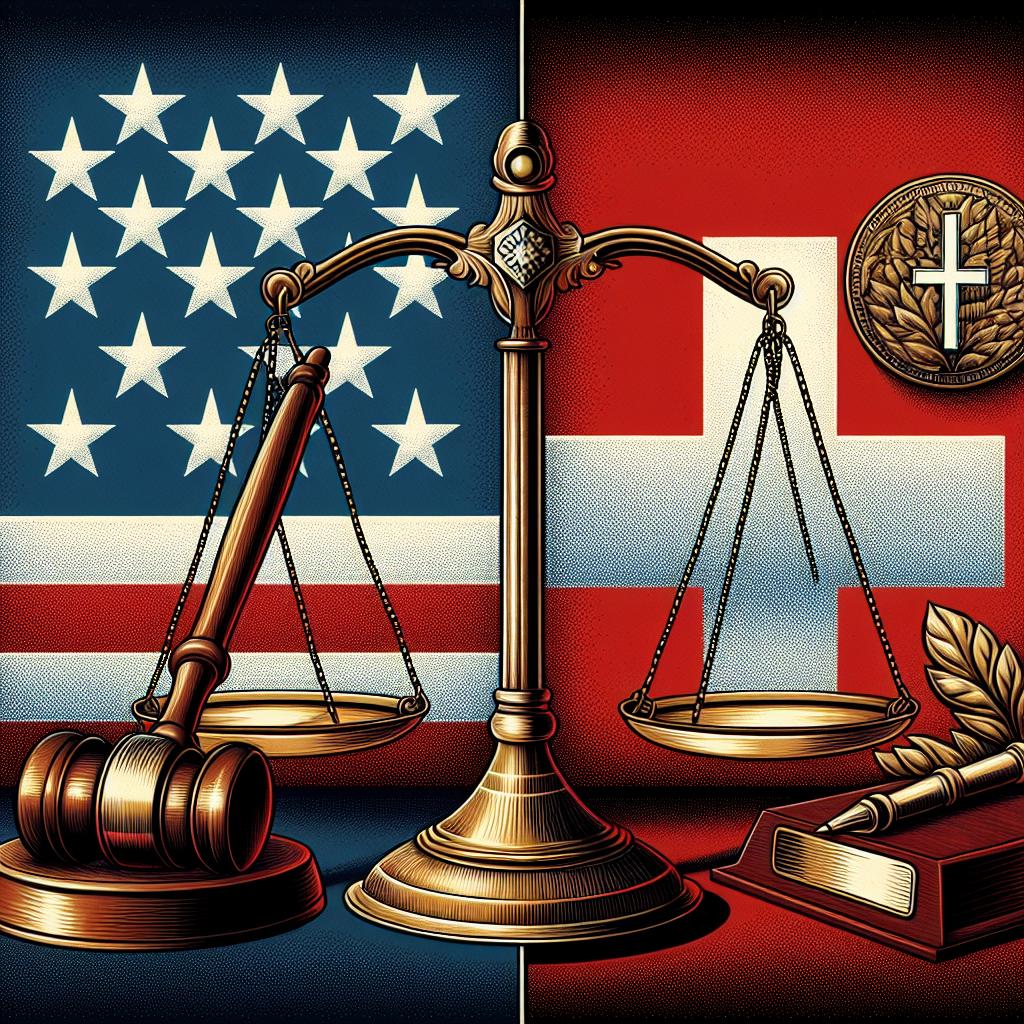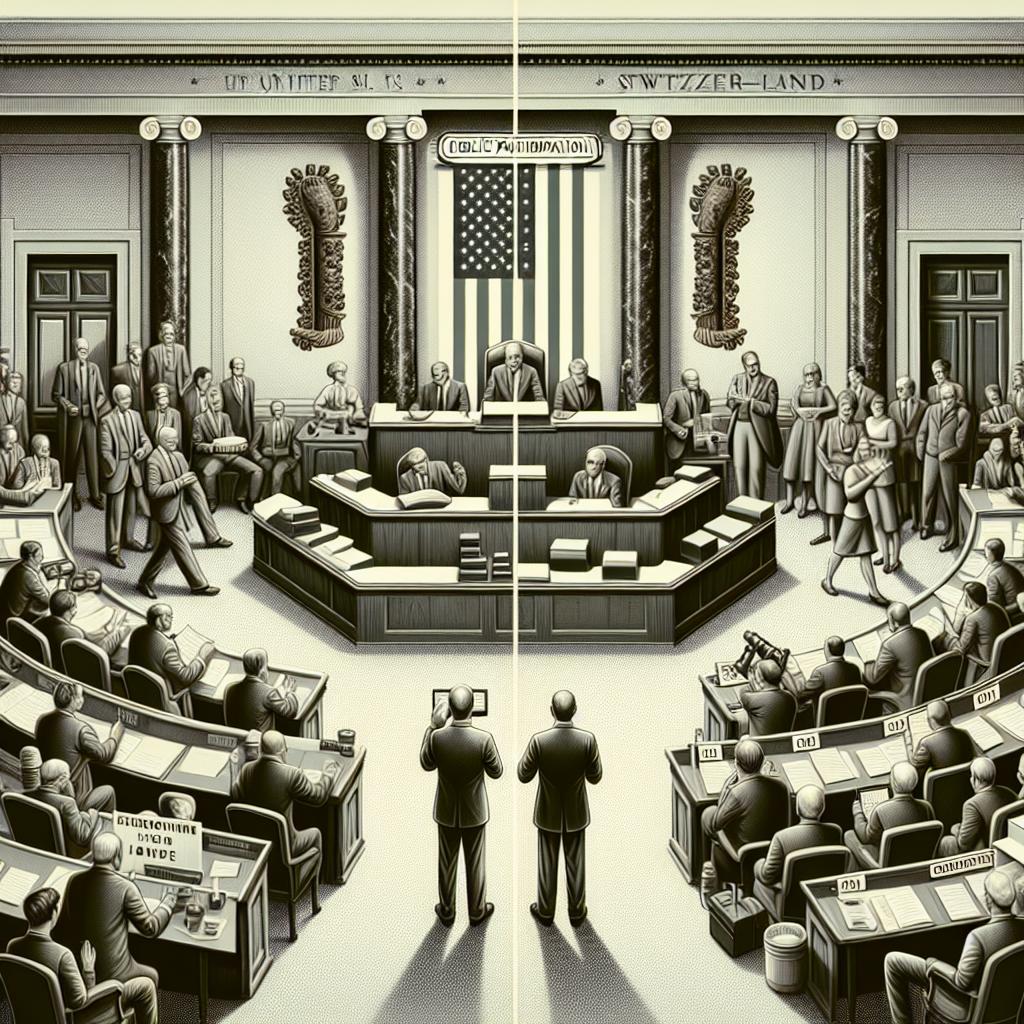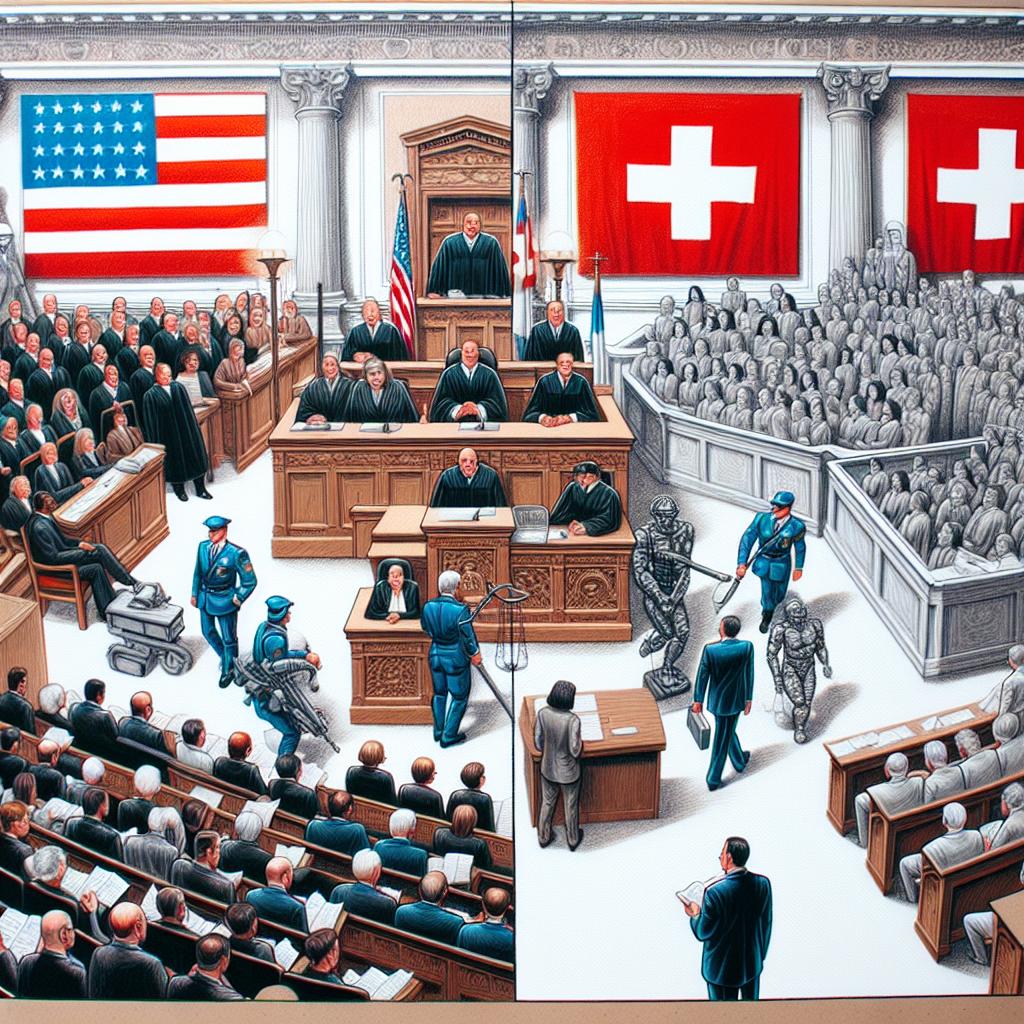Navigating the complexities of international law can be daunting, particularly when comparing legal systems as distinct as those of the USA and Switzerland. This article offers an insightful exploration of the key differences between these two legal frameworks, delving into their foundational principles, structures, and individual rights protections. Understanding these disparities is essential for anyone engaged in legal matters across borders, as the implications can significantly affect citizens’ rights and legal outcomes. We will unpack how USA law and Swiss law are formulated, the unique development of individual protections in each system, and the practical ramifications for those who find themselves within these jurisdictions. Join us as we unravel the intricacies of USA law versus Swiss law, providing clarity and guidance for individuals navigating these distinct legal landscapes.Explore the key differences between USA and Swiss law, from foundational systems to individual rights and practical implications for citizens.
Introduction To The Key Differences Between USA Law And Swiss Law

Understanding the legal frameworks of different countries is essential for both legal professionals and citizens. When discussing USA Law vs. Swiss Law, several key differences come to light, reflecting the unique social, cultural, and political landscapes of both nations.
Firstly, the structure of the legal systems varies significantly between the USA and Switzerland. While USA Law is founded on a common law system where judicial decisions and precedents play a crucial role, Swiss Law operates under a civil law framework, relying heavily on written statutes and codes.
Secondly, the representation and input structures differ. In the USA, laws can be influenced by a multitude of sources, including federal, state, and local governments, leading to a complex system of checks and balances. Conversely, Swiss Law emphasizes direct democracy, allowing citizens to partake in the legislative process through referendums and initiatives.
Moreover, the approach to individual rights showcases another disparity. The USA is known for its strong emphasis on individual rights protected by the Constitution, often leading to landmark Supreme Court decisions. In contrast, Switzerland’s approach is more community-oriented, placing a greater emphasis on social rights and collective welfare.
Lastly, the outcomes of legal proceedings tend to differ markedly. The USA Law system, characterized by adversarial trials, can lead to unpredictable outcomes influenced by the parties’ resources and representation. On the other hand, Swiss Law features a more inquisitorial approach, where judges play an active role in investigating and determining the facts of a case, often resulting in more consistent rulings.
In summary, the differences in legal traditions, structures, rights protection, and judicial outcomes create a fascinating landscape when comparing USA Law vs. Swiss Law. Understanding these distinctions is vital for anyone navigating legal matters in either country.
Foundation Of Legal Systems: USA Law Vs. Swiss Law

The foundation of legal systems in the context of USA law and Swiss law demonstrates a clear contrast in structure, principles, and historical evolution. At its core, the legal system in the United States is based on common law principles. This system emphasizes case law, where judicial decisions play a critical role in shaping the law. Judges interpret statutes and precedents, which can lead to variations in interpretations across different jurisdictions. In this context, the flexibility of USA law allows for an evolving legal framework that can adapt to changing societal values.
In contrast, the Swiss legal system is deeply rooted in civil law traditions, primarily influenced by the Napoleonic Code. This system emphasizes written statutes that are codified to provide clear guidelines for legal proceedings. Judges in Switzerland primarily apply the law as it is written, which tends to result in a more uniform application of justice across the country. The Swiss system values legal certainty and predictability, which can be seen as a stabilizing force in its legal environment.
Moreover, the integration of cantonal (state) laws alongside federal laws in Switzerland showcases a decentralized approach to governance. Each canton has its own legal system that aligns with the federal legal framework while allowing for regional differences. This stands in stark contrast to the federal system of the USA, where state laws can differ widely, leading to a more fragmented legal landscape.
Understanding these foundational differences is crucial for citizens and legal professionals navigating the complexities of USA law vs. Swiss law. It underscores the importance of context when engaging with legal issues in these two distinct jurisdictions.
Input Structures: How USA Law And Swiss Law Are Formulated

The formulation of laws in the USA and Switzerland showcases distinct approaches influenced by their respective political, social, and historical contexts. In the USA, law is primarily formulated through a combination of legislation, regulation, and case law, where both federal and state legislatures create statutes that govern various aspects of public and private life. This system places significant emphasis on judicial precedents, meaning that decisions made in higher courts can influence future cases, creating a body of law that evolves over time.
Conversely, in Swiss Law, the legal framework is heavily influenced by both federal and cantonal (state) legislation, reflecting the country’s federal structure. Switzerland employs a unique participatory approach where citizens have the power to propose changes to existing laws through initiatives and referendums. This direct democracy allows for a more community-driven formulation of law, ensuring that legal changes align closely with the public’s interests and values.
Moreover, the Swiss legal system consists of written codes that simplify the understanding of laws, promoting clarity and accessibility. In contrast, the expansive case law in the USA results in a more complex legal environment where individuals often require legal counsel to navigate various statutes and precedents.
Both systems fundamentally aim to establish justice and maintain order; however, their methods of law formulation highlight differences in governance philosophy and societal values. Understanding these distinctions in law formation is crucial for individuals navigating the legal landscapes in both nations.
Development Of Rights: Individual Protections Under USA Law And Swiss Law

When examining the scope of individual protections, the differences between USA Law and Swiss Law become quite apparent. Both legal systems aim to uphold the rights and liberties of individuals but do so in distinct ways due to their cultural, historical, and societal contexts.
In the USA, individual rights are primarily enshrined in the Constitution, particularly within the Bill of Rights, which guarantees essential freedoms such as speech, religion, and due process. These rights have evolved through landmark rulings by the Supreme Court, ensuring that they adapt to emerging societal values. For instance, cases related to civil rights have shaped the interpretation of equality and personal freedom significantly.
Conversely, Swiss Law emphasizes the role of a federal structure that fosters a high level of individual rights protection through its Constitution and various cantonal laws. Switzerland’s commitment to neutrality and multiculturalism reflects in its legal frameworks, prioritizing the principle of equality and the protection of minority rights. The Swiss Federal Constitution guarantees a wide range of rights, including privacy, freedom of assembly, and the right to participate in direct democracy.
Furthermore, while the USA often relies on judicial interpretations of rights, Switzerland includes mechanisms for citizens to directly influence laws and policies, such as referendums. This participatory approach allows Swiss citizens to advocate for their rights actively and ensures that individual protections remain in tune with public sentiment.
The means of enforcing these rights also differ. In the USA, citizens might seek redress through civil litigation, often relying on lawyers to advance their cases, which can become costly. On the other hand, in Switzerland, the legal aid system is more accessible, allowing individuals to pursue their rights with governmental support, fostering a more equitable landscape.
In summary, while both USA Law and Swiss Law prioritize the protection of individual rights, the mechanisms, cultural contexts, and legal philosophies significantly shape how these rights are developed and maintained within each system.
Results Of Legal Proceedings: Comparing USA Law And Swiss Law Outcomes

When examining the outcomes of legal proceedings under USA Law compared to Swiss Law, notable differences emerge that reflect the distinct legal cultures and principles governing each system. Understanding these differences is crucial for both legal practitioners and individuals caught in the legal process.
Judicial Outcomes
In the USA, judicial outcomes often favor litigious approaches, where parties may engage in extensive pre-trial discovery processes, leading to lengthy and costly legal battles. This system frequently results in substantial monetary awards in personal injury cases, often influenced by the jury’s perceptions and the persuasive power of the attorneys involved.
Conversely, the Swiss system is characterized by a more conciliatory approach, emphasizing mediation and arbitration. Swiss courts tend to focus on swift resolutions, and punitive damages are generally less prevalent. This is indicative of the Swiss legal framework’s aim to promote social harmony and minimize conflict.
Appeals and Reviews
In the USA, appeals can extend the duration of legal processes substantially, where higher courts often scrutinize lower court decisions. This appeals system not only delays final outcomes but can also create inconsistencies across jurisdictions, leading to a varied interpretation of laws.
In contrast, the Swiss legal system has a more streamlined appeals process, which is designed to ensure uniformity and clarity in the application of law. The Swiss Federal Supreme Court often handles appeals with a focus on legal principles rather than re-evaluation of facts, promoting consistent jurisprudence.
Enforcement of Judgments
The enforcement of legal judgments in the USA can be complex, often involving additional litigation to enforce a judgment, especially across state lines. The decentralized nature of legal enforcement can lead to variations in how judgments are treated among different states.
On the other hand, the enforcement mechanisms in Switzerland benefit from the country’s adherence to international agreements and treaties, making it easier to execute judgments not only domestically but also in cross-border cases.
In conclusion, while both USA Law and Swiss Law aim to deliver justice, the substantial differences in legal proceedings’ outcomes highlight the varying philosophies and practices that underpin each system. These differences can have significant implications for individuals navigating legal issues within either jurisdiction.
Practical Implications Of USA Law Vs. Swiss Law For Citizens

The contrast between USA Law and Swiss Law has substantial practical implications for citizens in each jurisdiction. Understanding these differences is crucial for individuals and businesses navigating legal landscapes in either country.
Legal Rights and Protections
Citizens in the United States benefit from a system that emphasizes individual rights and liberties, particularly through the Bill of Rights. This set of amendments provides robust protections, notably in areas such as freedom of speech, religion, and the right to bear arms. In contrast, Swiss Law emphasizes communal rights and direct democracy, where citizens have significant influence on legislation through initiatives and referendums.
Access to Justice
In the USA, access to justice can be a considerable challenge due to the high cost of legal representation and the complexity of the judicial system. Conversely, the Swiss legal system is known for its efficiency and lower costs, often enabling citizens to represent themselves more easily in simple legal matters. This makes Swiss Law more accessible for the average citizen when seeking legal recourse.
Regulatory Environment
When it comes to business operations, the regulatory environment varies significantly. The US legal framework can be more litigious, posing potential risks for businesses in areas such as contract compliance, liability, and intellectual property. On the other hand, Swiss Law generally favors a more collaborative approach to regulations, prioritizing stability and predictability, which is appealing to businesses seeking to operate in a reliable market.
In conclusion, the practical implications of USA Law vs. Swiss Law extend far beyond legal principles. They affect citizens’ rights, access to justice, and the business climate in profound ways. Understanding these distinctions empowers individuals and organizations to make informed decisions when engaging in legal matters within these two very different legal frameworks.
Frequently Asked Questions
 What are the key differences between USA law and Swiss law?
What are the key differences between USA law and Swiss law?
The key differences include the basis of legal systems; the USA follows a common law system, while Switzerland operates under a civil law system. This affects case law, regulation interpretations, and constitutional structure.
How does the legal process in the USA differ from that in Switzerland?
In the USA, trials may be conducted by juries, whereas Swiss trials often involve judges. Additionally, the adversarial system in the USA contrasts with the inquisitorial system used in Switzerland.
What is the role of federal law in the USA compared to Swiss law?
In the USA, federal law is supreme over state law, whereas Swiss law consists of cantonal laws that coexist with federal laws, giving significant power to the individual cantons.
How do property laws vary between the USA and Switzerland?
Property laws in the USA allow for easier individual ownership and conveyance, while Swiss property laws can involve more restrictions, including regulations on foreign ownership.
What are the approaches to privacy laws in both countries?
The USA has sectoral privacy laws which vary by industry, while Switzerland is known for its strong data protection regulations that provide comprehensive coverage.
How does the concept of liability differ between USA law and Swiss law?
In the USA, liability cases often center around negligence and tort law, with the potential for punitive damages, while Swiss law typically emphasizes strict liability without punitive damages.
Is there a difference in the enforcement of contracts in the USA versus Switzerland?
Yes, enforcement of contracts in the USA is largely based on common law principles, which can lead to variable interpretations, while Swiss contract law is more uniform and codified, aimed at promoting predictability.
